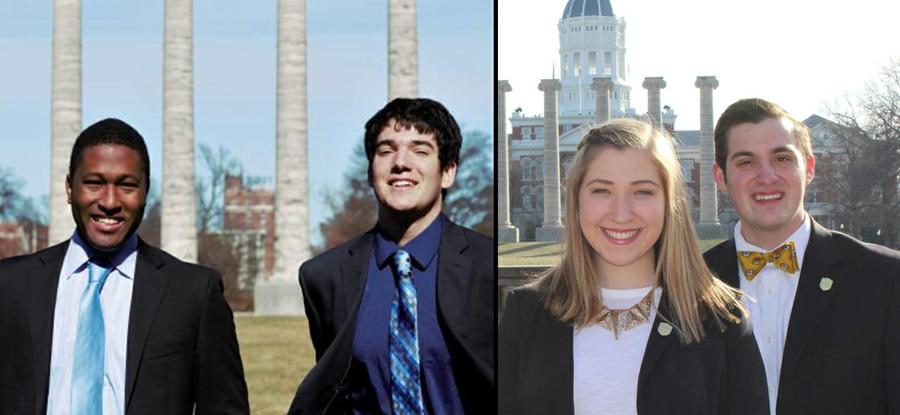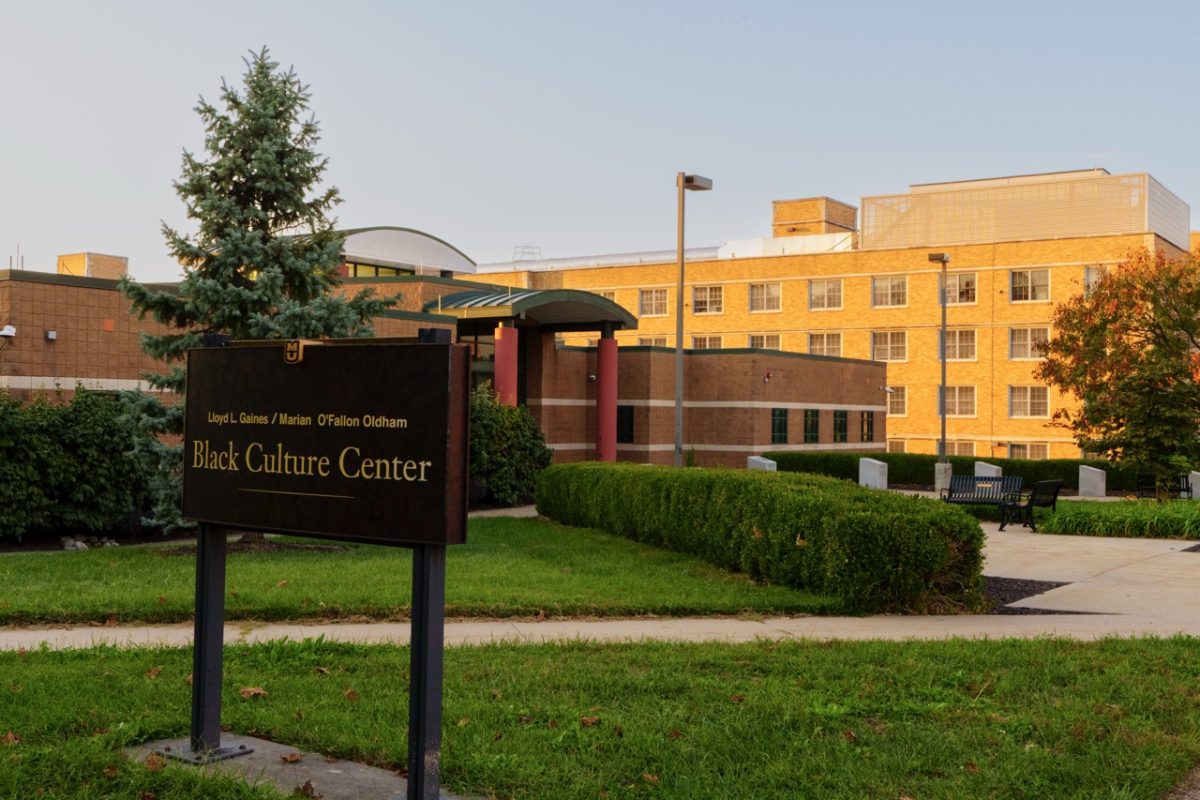The candidates for the Residence Halls Association presidential election participated in the only debate of the election cycle Sunday night. Voting opens at 10 a.m. March 1 and ends at 10 a.m. March 3.
The debate turned contentious at times, as the two slates butted heads over how best to deal with several issues. Here are five takeaways:
**1. Slates differ in RHA experience**
Maggie Recca and Mitchell Davis of the “Move Mizzou” slate both have experience in RHA, as programming coordinator on the executive board and Senate residential life chairman, respectively.
On the other hand, Solomon Davis and Jeremy Richmond, who have named their campaign “Unify Mizzou,” both have experience in RHA as presidents of their respective halls, Hatch and Wolpers.
“A very important part of being president and vice president is understanding the organization,” Recca said. “I think that it’s important to know exactly what RHA’s role is.”
Recca and Mitchell Davis cited their experiences working with the residents in their halls and social justice centers on campus as qualifications for the positions.
Solomon Davis and Richmond pointed to their roles as presidents of their halls as proof of their leadership capabilities. Richmond said that developing relationships with his executive board at Wolpers helped to build a community within the hall.
“We had representation from every floor and basically made sure that we could reach out to all students and continue to build those relationships and that family atmosphere,” Richmond said.
Members of both slates said they had experience drafting legislation, and both slates said organizing events at their halls has given them insight into community-building.
**2. Recca/Davis emphasize safety**
A core tenet of the Recca/Davis platform is campus safety, which the pair hopes to address with new policies on the blue light safety alert system on campus, Green Dot training and mental health resources for residents.
Recca said that if she had to choose, improving the blue light system on campus is her campaign’s top priority. She and Mitchell Davis hope to increase the number of blue lights around campus.
“It is quite honestly terrifying as a female living on campus to walk home at night, and that’s not okay,” Recca said.
Another prominent safety item on the Recca/Davis platform is the proposed addition of an RHA support hotline, a sort of catch-all support system that would provide residents a confidential outlet to express concerns. The hotline would take the form of residents emailing the executive board members, whom Recca said would be trained through the Counseling Center.
The platform also advocates for increased visibility for existing resources such as the suicide hotline and Counseling Center.
**3. Davis/Richmond emphasize diversity via “trickle-down”**
Diversity within RHA was a hot topic at the debate. Solomon Davis said working with social justice centers is key in promoting diversity within RHA.
“If we want RHA to represent all people, we want to be advertising in those centers for RHA positions, because we want a more diverse group of people,” Solomon Davis said. “That will be something that we will be committed to and focused on.”
Richmond said diversity within RHA leadership would ultimately lead to diversity within the body.
“We believe that diversity in leadership will build a trickle-down effect and enhance that diversity and inclusion within the community,” he said.
**4. Slates disagree on whether to create separate programming and housing for upperclassmen**
The two platforms clashed over the idea of separate residence halls or living communities for upperclassmen. The Recca/Davis platform advocates for the separate programming as a possible way to encourage students who aren’t freshmen to continue living in the residence halls.
Recca said upperclassmen might be more inclined to participate in and return to the residence hall community in an environment with fewer freshmen.
“It would allow upperclassmen to live and learn in a community together with students that are not first-year students,” Mitchell Davis said.
Solomon Davis said that separation would impede the sense of community found in the residence halls and that encouraging a better relationship between residents and RHA was the best way to keep residents coming back.
“When we talk about Unify Mizzou, we talk about a culture change, because I think a lot of decisions are made with a freshman perspective,” Solomon Davis said. “When we’re talking about diversity, that also means different year levels … Rather than separating and dividing, we should be unifying.”
**5. Both slates struggled to identify a time they have been racist, sexist or homophobic**
The candidates had difficulty answering a question asking them to reflect on a time they’d been racist, sexist or homophobic.
Neither Richmond or Solomon Davis provided a specific example, but Solomon Davis cited a dispute between some residents in his hall over a Trump sign as an example of his ability to encourage diverse viewpoints.
“Each one of us has biases, and that’s something that everyone should work on,” Solomon Davis said. “We’re all college students, we’re all from different backgrounds, and so we need to be respectful of those differences.”
“We want to build a campus that cares about what people feel, and respects that,” Richmond added.
Recca brought up an encounter she had with a student who used ne/nem/nir pronouns as a time in which she had to reevaluate her own conceptions. However, she misgendered the student again while recounting the incident by using incorrect pronouns.
“I realized that there will be times that you have to ask people things like what are your pronouns, what do you prefer,” Recca said. “You have to be respectful of all people, be empathetic, and truly whenever you do make those mistakes, not have the pride and say, ‘I am sorry’ and not do it again.”
Mitchell Davis couldn’t recall a specific instance but said that “it’s important to recognize that diversity is very important to campus, and if we can encourage it, it makes living on campus so much better.”
Both slates acknowledged the influence of cultural backgrounds on conceptions about topics like race.
_Edited by Emily Gallion | [email protected]_








